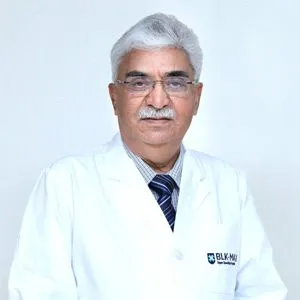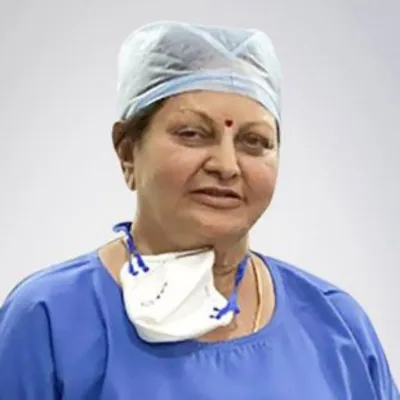Best Orthopedic Surgeons in Artemis Hospital Gurgaon
 17 December,2025
Read More
17 December,2025
Read More
Starting From: USD 4700-7400
Procedure Type: Minimally Invasive Procedure
Hospitalization Days: 3-4 Days
Procedure Duration: 2-4 Hrs
Recovery Time: 3-4 Weeks
Success Rate: 99%
Minimally invasive mitral valve surgery in India costs between USD 4,700 and 7,400 in 2025. This advanced cardiac procedure ensures a faster recovery time of 3 to 4 weeks, a shorter hospital stay, and a high success rate of 90% to 99%, making it a preferred option for patients seeking effective, low-risk heart treatment with minimal downtime.
The minimally invasive mitral valve surgery cost in India has become more accessible due to advancements in cardiac procedures. The mitral valve regulates blood flow between the heart's left atrium and left ventricle. If it fails to function correctly due to conditions like mitral stenosis or regurgitation, it can lead to severe heart complications. When patients experience this abnormal condition, their heart needs to put in extra effort to pump blood until it eventually results in heart failure.
Unlike traditional open-heart surgery:
1. Mechanical Valves
These are made from strong materials and can last a lifetime. However, patients need to take blood-thinning medicines for life to prevent clotting.
2. Bioprosthetic Valves
These are made from animal tissue (such as a pig or cow valve). They do not usually require long-term blood thinners, but may need to be replaced after several years.
Each option has benefits, and your doctor will help you choose the best one based on your health condition and lifestyle.
Patients who benefit most from affordable, minimally invasive mitral valve surgery in India share the following characteristics:
1. Only Mitral Valve Needs Repair or Replacement: The procedure works best when the mitral valve is the only area needing attention, without other heart issues involved.
2. Strong Heart Muscle Function: A well-functioning left ventricle (the heart's main pumping chamber) helps support a smooth and successful surgery.
3. Little to No Leakage in the Aortic Valve: When the aortic valve is working normally, it’s easier to focus safely on the mitral valve.
4. Minimal Calcium Around the Valve: Less calcium buildup (also called calcification) in and around the mitral valve makes the repair or replacement process more straightforward.
5. Healthy Blood Vessels in the Legs: Good blood flow through the femoral arteries (in the thighs) is important since the surgical instruments often pass through them. A clear path ensures everything works smoothly.
6. No Prior Surgeries or Radiation on the Right Side of the Chest: Previous surgeries or radiation in that area can cause scar tissue, which might make it harder or riskier to use a minimal access approach.
Minimally invasive mitral valve replacement cost in India typically ranges as follows:
These figures reflect affordable, minimally invasive mitral valve surgery in India under standard conditions.
Several elements can push your mitral valve replacement bill higher or lower. The main factors affecting minimally invasive mitral valve surgery cost in India are as follows:
1. Type of Valve Used: Mechanical valves are more durable but require lifelong medication, increasing long-term costs; bioprosthetic (tissue) valves are cheaper upfront but may need replacement in 10–15 years.
2. Hospital Location & Reputation: Leading hospitals in cities like Delhi, Mumbai, and Bengaluru charge more due to advanced facilities and specialists; Tier-2 city hospitals may offer quality care at lower rates.
3. Surgeon’s Expertise: Highly experienced or internationally trained surgeons may charge more for their expertise and advanced surgical skills.
4. Surgical Approach: Minimally invasive procedures are generally on the costlier side, as they involve specialized equipment and techniques.
5. Hospital Stay Duration: A standard hospital stay lasts 5–7 days, but complications or extended recovery can increase overall costs.
6. Pre-existing Medical Conditions: Conditions like diabetes, hypertension, or kidney issues may require extra care and testing, raising total treatment expenses.
The low cost of minimally invasive mitral valve surgery in India attracts patients from across the globe. Here’s a rough estimate for some major Indian cities:
|
City |
Min (INR) |
Max (INR) |
Min (USD) |
Max (USD) |
|
Delhi |
INR 4,00,000 |
INR 7,00,000 |
USD 5,000 |
USD 8,750 |
|
Mumbai |
INR 4,50,000 |
INR 7,50,000 |
USD 5,625 |
USD 9,375 |
|
Bengaluru |
INR 4,00,000 |
INR 7,00,000 |
USD 5,000 |
USD 8,750 |
|
Chennai |
INR 4,00,000 |
INR 7,00,000 |
USD 5,000 |
USD 8,750 |
|
Hyderabad |
INR 3,50,000 |
INR 5,50,000 |
USD 4,375 |
USD 6,875 |
|
Ahmedabad |
INR 4,00,000 |
INR 6,00,000 |
USD 5,000 |
USD 7,500 |
|
Kolkata |
INR 4,00,000 |
INR 6,00,000 |
USD 5,000 |
USD 7,500 |
|
Pune |
INR 4,00,000 |
INR 6,00,000 |
USD 5,000 |
USD 7,500 |
|
Gurgaon |
INR 4,00,000 |
INR 7,00,000 |
USD 5,000 |
USD 8,750 |
|
Chandigarh |
INR 4,00,000 |
INR 6,00,000 |
USD 5,000 |
USD 7,500 |
|
Country |
Approx. Range (USD) |
|
India |
USD 4,700 – USD 7,400 |
|
Turkey |
USD 12,000 – USD 24,500 |
|
Thailand |
USD 10,900 – USD 12,100 |
|
UAE |
USD 30,110 – USD 40,950 |
|
UK |
USD 43,000 – USD 50,000 |
|
USA |
USD 50,000 – USD 2,00,000 |
India’s reputation for low-cost cost minimally invasive mitral valve surgery, combined with top-tier care, makes it a trusted choice worldwide.
1. Consultations and Diagnostic Tests:
2. Other Evaluations: If you have coexisting conditions like hypertension or diabetes, additional tests may be required.
Many hospitals in India accept both Indian and international health insurance for minimally invasive mitral valve surgery costs in India. If you have insurance, check with your provider to see what expenses are covered, such as hospital fees, surgeon’s charges, medicines, and post-surgery care. Some plans may also include pre-surgery tests and follow-up visits.
If you do not have insurance, hospitals often offer flexible payment plans or financing options to make the surgery more affordable. You can also explore medical loans to help cover the costs. Talk to the hospital’s finance team to find the best payment option for you.
Trying to reduce the minimally invasive mitral valve repair cost in India? These tips can help reduce expenses while ensuring quality treatment.
Managing heart surgery abroad can seem complex, but with the right support, it doesn’t have to be. MediJourney helps simplify the process by offering access to top hospitals and expert cardiac surgeons, with transparent guidance on the minimally invasive mitral valve surgery costs in India.
Our network includes leading cardiac care centers, where patients receive advanced treatment and personal care. MediJourney assists with hospital coordination, insurance navigation, and financial planning, ensuring every aspect of the treatment journey is clear and stress-free.
Support goes beyond surgery. From visa documentation to airport pickup, interpreter support, and comfortable accommodation, every detail is taken care of. At MediJourney, patients are always a priority, not just a case number.
Start planning your mitral valve repair in India today with trusted experts by your side. Contact us today.
Answer: The cost typically ranges from USD 4,700 to USD 7,400, depending on the hospital, surgeon's expertise, and procedure type.
Answer: Key factors include the type of surgery (repair or replacement), hospital location, choice of valve (mechanical or tissue), surgeon’s fee, hospitalization duration, and post-surgery care needs.
Answer: Submit medical reports and recent diagnostic results to the hospital or medical facilitator. They can provide a personalized estimate after reviewing your condition and recommended treatment.
Answer: Recovery usually takes 3 to 4 weeks, with most patients resuming light activities in 2 weeks and full recovery in about a month.

Chairman
Interventional Cardiologist
BLK-Max Super Speciality Hospital, New Delhi

Director
Cardiologist, Interventional Cardiologist
Max Super Speciality Hospital, Saket, New Delhi

Chairman
Cardiac Electrophysiologist, Interventional Cardiologist
BLK-Max Super Speciality Hospital, New Delhi

Consultant
Interventional Cardiologist
Indraprastha Apollo Hospital, New Delhi

Head of Department (HOD)
Cardiologist
Nanavati Super Specialty Hospital, Mumbai

Consultant
Interventional Cardiologist
Apollo Hospital Chennai, Greams Road
Doctor of Pharmacy
Dr. Deepanshu Siwach is a skilled clinical pharmacist with a Doctor of Pharmacy degree.?He has 4+?years of experience and has worked with thousands of patients. He has been associated with some of the top hospitals, such as Artemis Gurgaon.
Dr. Deepanshu Siwach is a skilled clinical pharmacist with a Doctor of Pharmacy degree.?He has 4+?years of experience and has worked with thousands of patients. He has been associated with some of the top hospitals, such as Artemis Gurgaon....
Dr. Aseem Ranjan Srivastava is an experienced Pediatric Cardiothoracic Surgeon specializing in Minimal Access and Robotic Cardiac Surgery. He strongly recommends prompt corrective repair when possible....
The Art of Effective Communication
 17 December,2025
Read More
17 December,2025
Read More
 16 December,2025
Read More
16 December,2025
Read More
 10 December,2025
Read More
10 December,2025
Read More
 09 December,2025
Read More
09 December,2025
Read More
 05 December,2025
Read More
05 December,2025
Read More
 04 December,2025
Read More
04 December,2025
Read More